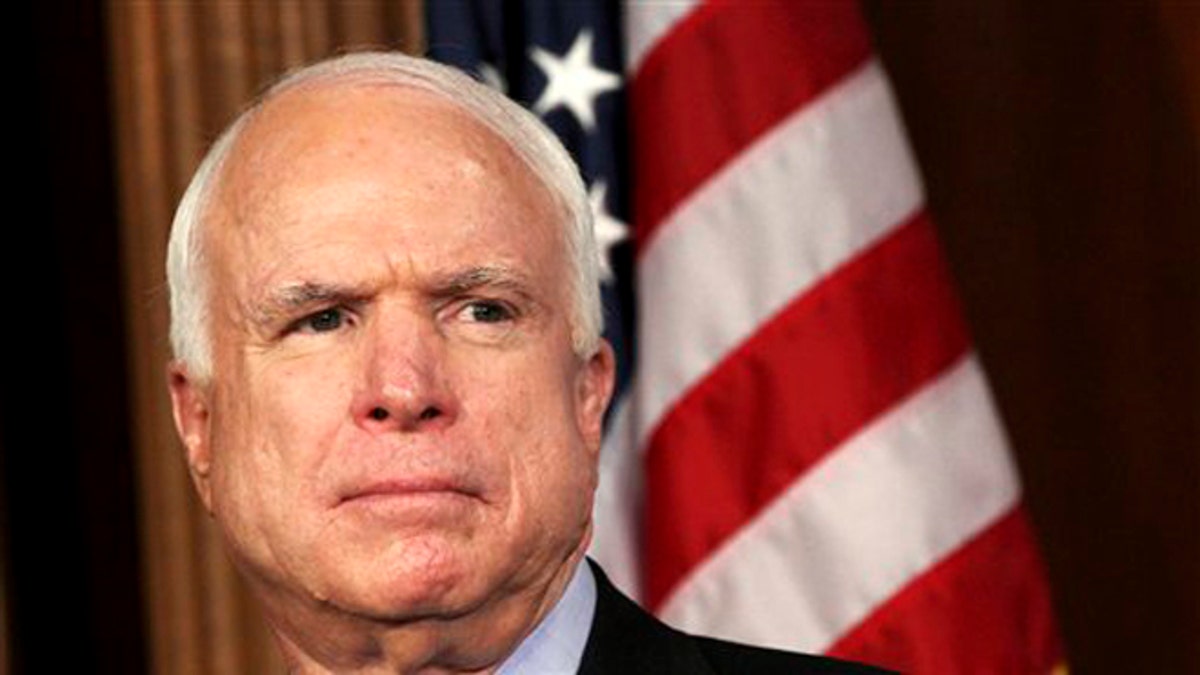
Sen. John McCain, R-Ariz., is defending his old Senate colleague and fellow Vietnam veteran. (AP)
Sen. John McCain, who is seeking his sixth term in the Senate, representing Arizona, says he is concerned that hardline rhetoric among GOP candidates running for president will alienate Latinos.
“The increasing demographic makes the Hispanic voter much more important than maybe [ever] in the past,” said McCain in an interview with Fox News Latino. “I don’t believe any Republican can be elected in the United States without a certain proportion of the Hispanic vote.”
McCain took particular exception to Donald Trump’s harsh words about Mexico and immigrants from there.
Trump launched his campaign assailing Mexico for, as he put it, dumping its worst people along the border, and said that immigrants trying to enter the United States from there included rapists and drug dealers, among other things.
Since then, Trump has cranked up his hard line on immigration, and vowed to round up all the nation’s undocumented immigrants and deport them. Trump also has taken shots at fellow presidential rival Jeb Bush for speaking Spanish on the campaign trail, and has pushed for ending automatic citizenship to U.S.-born babies of undocumented immigrants.
“I’m very concerned about that kind of rhetoric about our Hispanic citizens,” said McCain, who was the GOP presidential nominee in the 2008 race against Barack Obama. “It’s alienating a very significant majority of Hispanic voters.”
Early on after Trump’s announcement that he was running for president, McCain condemned his confrontational tone about Mexico and immigration.
In an interview with MSNBC, McCain said that Trump’s views were not so much problematic for the GOP as for the county at large.
McCain said that while he supports tightening border security, Trump’s characterization of Hispanics did no justice to the reality of the positive impact that Latinos have had in places such as his home state.
“It’s added to the beauty and the enormous attractiveness of our state of Arizona, and we are proud of our Hispanic heritage, of our missions from Spain that came up to Tucson back hundreds of years ago,” McCain said shortly after Trump’s first controversial comments.
“And so I think Mr. Trump maybe should realize that we in Arizona, we want a secure border and we have to have a secure border but…we are greatly appreciative of everything [Hispanics] have done for our state, our culture, our economy, and everything else about our state. We are far richer for having had them in our state.”
Trump’s campaign did not respond to a request by Fox News Latino for a comment on McCain’s statements.
McCain says that, in general, Republicans have their work cut out for them when it comes to gaining the support of Latinos. He said attracting Latinos to the GOP has been getting harder, adding “that’s a fact.”
George W. Bush was able to win about 40 percent of the Latino vote in his re-election in 2004, a feat considered quite remarkable.
McCain got 31 percent of the Latino vote when he ran against Obama, well below Bush but better than Mitt Romney’s 27 percent in 2012 and Sen. Robert Dole’s 21 percent in 1996. McCain’s share of the Latino vote was more in line with what GOP candidates tended to capture in congressional races.
Many of the Latinos who supported Obama initially backed Hillary Clinton when she ran in the 2008 primary against him, but then switched to him when he won the Democratic nomination.
McCain says his pick for president would be Sen. Lindsey Graham, a fellow Republican from South Carolina, whom the Arizonan views as the best equipped to deal with the domestic and global issues facing the United States. He does not think highly of Sen. Ted Cruz, a Texas firebrand whom McCain famously dismissed as a "wacko bird" in 2013.
McCain knows well the hot potato that immigration can be, especially in elections.
He was part of two major bipartisan efforts to push comprehensive immigration reform in Congress – in 2007 and again in 2013. In 2008, he drew criticism for pushing for stronger border security, which in the eyes of detractors, signaled a flip flop for the sake of appealing to conservatives who got angry with his role in backing measures to give undocumented immigrants a chance to legalize their status.
In 2013, he was part of the Senate’s so-called “Gang of Eight” – four Democrats and four Republicans – who were behind a sweeping immigration reform measure that called for stronger enforcement but also a path to legal status for undocumented immigrants who could meet a strict set of criteria.
It passed in the Senate, but then stalled in the House, where a conservative faction fought any effort to consider a vote what they called amnesty, or rewarding law-breakers.
“Some in the Hispanic community don’t approve of my approach,” McCain said, adding that he thought it was because the nuances of his views and proposals were not always understood. “I’m proud of my relations with the Hispanic community, and I’m proud of my record on the whole issue of immigration, even though I’ve had criticism from many in my own party.”
The senator said he believes Republicans can gain the trust and support of Latinos.
“We share so many values – support for small business, for military, for family. But Republicans have to fight for Hispanic voters.”
For his part, McCain said, “I understand I have to keep earning it.”




